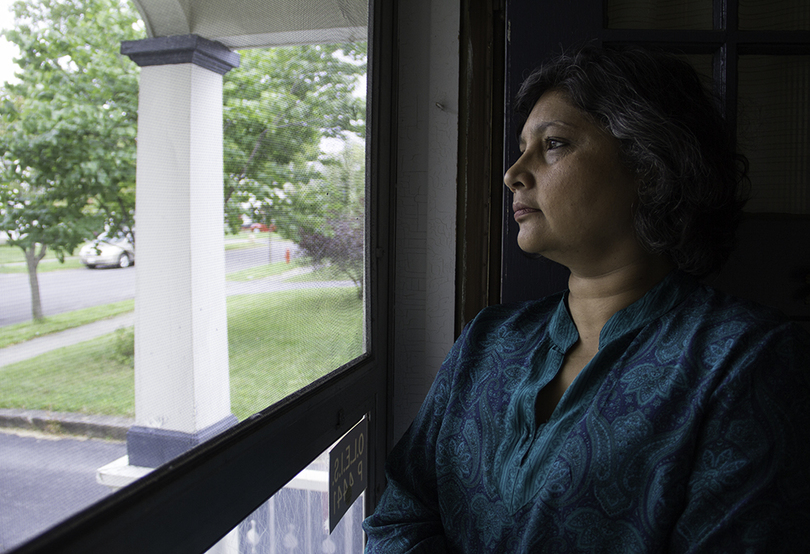Founder of Human Rights Film Festival improves community through activism
Tula Goenka’s activism is rooted in her family.
Her grandmother was a freedom fighter against the British as a part of the Quit India movement in the 1940s. Her mother, a committed volunteer worker at a local orphanage, established a free hospital for disabled people. And her daughter, who has become increasingly involved in social issues, is planning an upcoming speech at the United Nations.
“I believe that children are greatly influenced by parents, especially when it comes to the guiding principles of their lives,” said Goenka, a television, radio and film professor. “The stories about my grandmother or seeing my mother being so involved at the grassroots level have given me a sense that I need to be involved in the community I live in.”
Goenka’s family history is only one of the inspirations that led her to found the Syracuse University Human Rights Film Festival, which celebrated its 12th anniversary this weekend.
In the past, the festival has featured films that highlight a number of social justice issues. This year, the five films focused on the theme “perspectives,” and included stories of black photographers, ousted gay couples and an Indian girl who became a victim of sex trafficking.
Goenka emigrated from India 30 years ago and obtained her master’s from the S.I. Newhouse School of Public Communications. From then on, Goenka said being Indian has continued to be a defining aspect of her life. She moved to New York City, became a film editor and in 1989 co-founded the organization Sakhi for South Asian Women to assist women affected by domestic violence.
“It’s difficult for me to separate my ‘Indianness’ from who I am and what I do,” Goenka said.
Eventually, Goenka moved back to Syracuse to begin her career as a professor, but did not leave her passion for social justice behind. As a result, Goenka was also appointed to the Chancellor’s Workgroup on Sexual Violence Prevention, Education and Advocacy.
Richard Breyer, a television, radio and film professor who taught Goenka as a graduate student, said her culture has helped shape her as a leader in the world today.
“She has a vision about the way the world should be,” Breyer said, “and it’s a positive one of respect.”
After originating from Goenka’s passion for issues of South Asia, the festival has now broadened to include films from all different cultures and backgrounds.
Roger Hallas, a professor of English and textual studies, co-directed the film festival with Goenka.
“We’re programming in ways that connect with causes people are teaching — what faculty and instructors and campus are addressing,” Hallas said.
But even so, the festival has maintained its South Asian roots with the showing of “Lakshmi,” a film featuring a 14-year-old girl who is abducted in India. Goenka said this particular film is intended to showcase a larger issue within a specific story.
“(Showing this film) doesn’t mean that there’s only sex trafficking in India. It happens everywhere. It’s a huge issue,” Goenka said. “It happens in the United States.”
Goenka knows first-hand the current issues that affect South Asia. Previously a co-director of the South Asia Center at SU, Goenka continues to rely on the center for events, promotions and her own personal well-being.
“The South Asia Center has been an integral part of my life,” Goenka said. “It gave me a sense of identity; it gave me belonging.”
Goenka said she has been coordinating with the current director of the South Asia Center, Susan Wadley, to make a film about Mithila art in India. After noticing a transition from this Indian folk-style to becoming a market commodity, Wadley and Goenka went off to Madhubani for 10 days in 2010 to capture this development on camera.
Wadley said this project had particularly demonstrated Goenka’s determination.
“She makes things happen, that’s the key point,” Wadley said.
Although the Mithila film has not yet been completed, Goenka said she has been involved with editing and producing other films including “Do The Right Thing,” “Malcolm X” and “Salam Bombay.”
“I don’t know whether those chose me or I chose them,” Goenka said. “I’ve been lucky to enough to be at the right place at the right time”
Amidst all of her achievements, Goenka still wonders if she made the right choice to leave India all those years ago.
“A friend of mine said to me, ‘Whatever your legal identity may be, your soul is Indian.’ And I think that’s really what it is,” Goenka said. “The land of my birth and the land of my soul will always be India.”
Published on September 22, 2014 at 12:01 am
Contact Jesse: jlnich02@syr.edu






